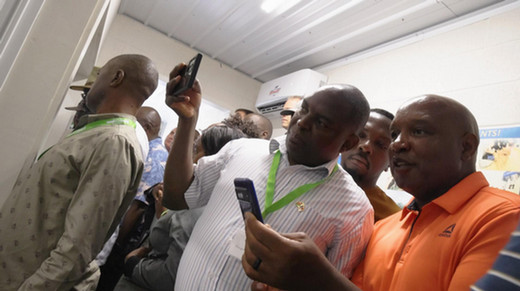Government leaders from the Republics of Malawi and Zambia listen to North Carolina Agricultural and Technical State University College of Agriculture and Environmental Sciences doctoral student Will Lashley explain the college’s ginger cultivation projects during a tour of the University Farm.
EAST GREENSBORO, N.C.The North Carolina Agricultural and Technical State University College of Agriculture and Environmental Sciences (CAES) welcomed a delegation of government leaders from the Republics of Malawi and Zambia to campus this summer to showcase agricultural research and techniques the nations may consider adopting.
The visit, in partnership with the N.C. Department of Agriculture and Consumer Services and the N.C. National Guard, is part of a program that seeks to build civilian partnerships between the African countries, the U.S. government and the agricultural sector through the National Guard Bureau State Partnership Program, which pairs U.S. states with partner nation military forces and government agencies to enhance national security.
Watch the video: https://www.youtube.com/watch?v=pSWk55rNpzs
Led by Zambia’s Minister of Defense Ambrose Lufuma, a group of about 50 toured the University Farm’s dairy, including the Automated Milking System; the beef cattle unit, emphasizing breeding techniques; the poultry unit; and the high-tunnel horticultural research area, including ginger research.
The delegates also learned about Cooperative Extension, a program they are considering implementing in their countries.
Zambia and Malawi both list agriculture as a major economic driver and source of employment, but face challenges including a three-year-long drought that has severely impacted food security in south-central Africa, said N.C. Agriculture Commissioner Steve Troxler.
“Agriculture is vital for the rural livelihoods of both nations,” Troxler said. “In both Zambia and Malawi, agriculture Is a major source of employment and economic driver. Both countries are implementing policies and initiatives to enhance agricultural productivity; however, the governments implementing these policies will face many challenges. That’s where assistance is needed and where N.C. agriculture has been asked to help.”
The group learned strategies for higher yields, how to use technology to grow more food on less acreage and climate-resilient agricultural practices, including water-saving practices.
“This is such an important partnership,” said Antoine Alston, Ph.D., CAES associate dean for academics. “When you lack the ability to feed your people, you have a security issue. N.C. A&T is uniquely poised to help the National Guard, in our national interest, thanks to the multitude of small-farms programs we have, which can easily be transferred to our Malawi and Zambia partners.”
The group’s other stops in North Carolina included a tour of the Piedmont Triad Farmers Market, the North Carolina State University livestock farm and Troxler’s Guilford County farm.
Media Contact Information: llbernhardt@ncat.edu


